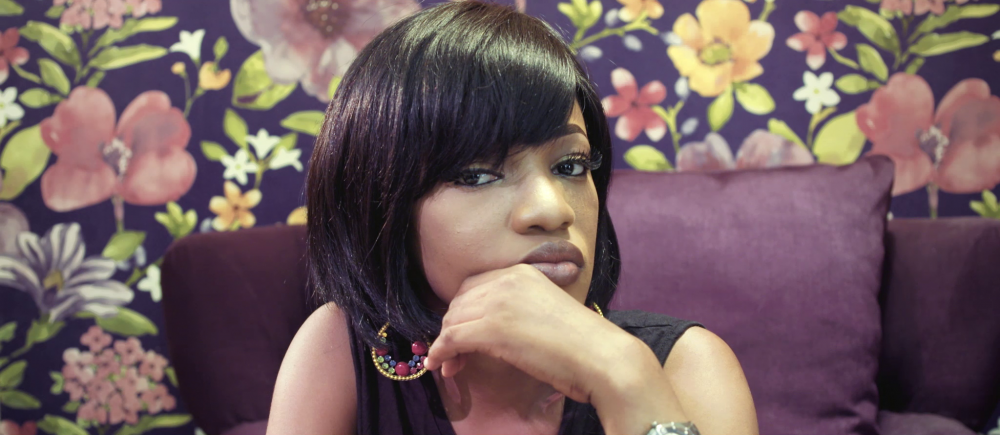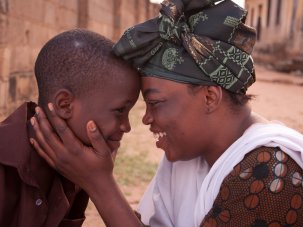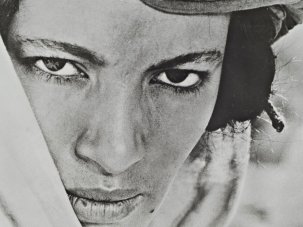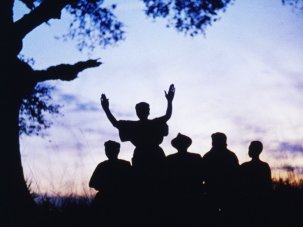It’s mid-afternoon in the Palms Mall, Lagos. For some, the venue is a welcome reprieve from the dry heat, smog and cacophonous horns of the Lekki Expressway. Polo by Ralph Lauren, Nike, MAC, Levis… all are housed within this suitably air-conditioned shrine to spending, where time moves slowly.
Short films by Mike Omonua and other Nigerian filmmakers are featured in I Just Dey Observe at the BFI Southbank in London on 18 August. Omonua is one of the filmmakers taking part in a Q&A after the screenings.
In the heart of the building a ritual drumbeat reverberates against the walls of a darkened auditorium – in their downtime, shoppers like to catch the latest Hollywood blockbuster or Nollywood hit. However, on this particular Wednesday afternoon, the films being shown aren’t from Hollywood or Nollywood. I am here for the seventh annual Africa International Film Festival (AFRIFF), which this year happens to showcase a quintessentially Nigerian articulation of arthouse cinema.
Onscreen there’s a coven, styled as a cross between Yoruba Ifà priestesses and Afro-Latina Brujaria. The characters perform a ritual dance, bathed in flickering firelight on the shores of the Atlantic. As the sun rises and the flames die, the group divides, leaving a beautiful lone priestess gazing out to sea, her sisters behind her watching in what could be an emotional farewell or scornful expulsion. In their silence, a telepathic bond is implied. As the sisters walk away the priestess’s solitary figure pivots away from our gaze, stepping back to reveal a new power. The credits roll and the ritual drum returns, this time sampled in a mode reminiscent of new wave pop from the 1980s.
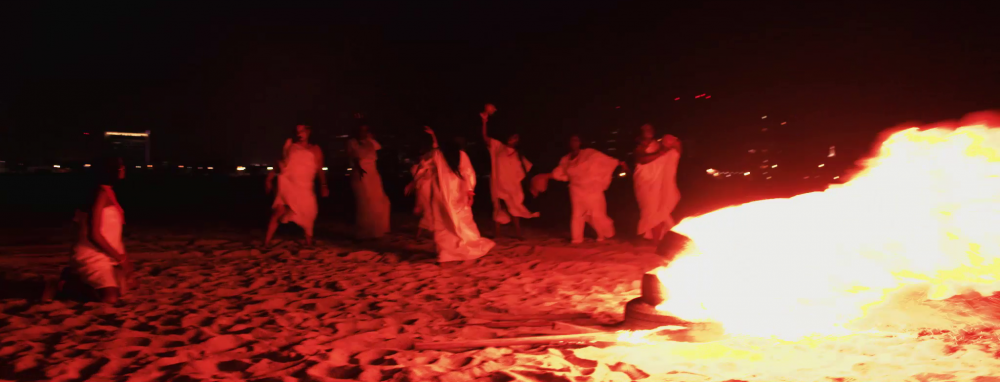
Bruja (2017)
As the lights come up on this premiere screening of Bruja (2017), the mood is split between those stimulated by where they’ve been taken and those altogether unclear. The film is one third of Visions, an anthology of three hypnagogic shorts based on dreams and reveries, all centred on the experience of a young woman (Valerie Dish). The authors of these films belong to the newly-formed Surreal16 Collective: genre maverick CJ ‘Fiery’ Obasi, responsible for Nigeria’s first zombie movie Ojuju (2014); Abba T Makama, whose 2016 coming of age satire of Nigerian society, Green White Green, toured the festival circuit widely following its premiere at TIFF’s Lagos City to City Spotlight; and lesser-known but no less prolific Mike Omonua, whose short films display an eye for polished realism and subjects plucked from the frayed moral fibres of Nigerian society’s underbelly.
Visions is a kind of tasting platter of what the group has to offer individually, as well as a collective, with each member directing one of the film’s chapters. Makama’s Shaitan (2017) gives a nightmarish spin to a conversation between two friends at a psycho-spiritual crossroads; Omonua’s Brood (2017) explores a holy trinity of heartbreak, angst and obsession, while Obasi’s Bruja depicts a relationship fracture within a coven.
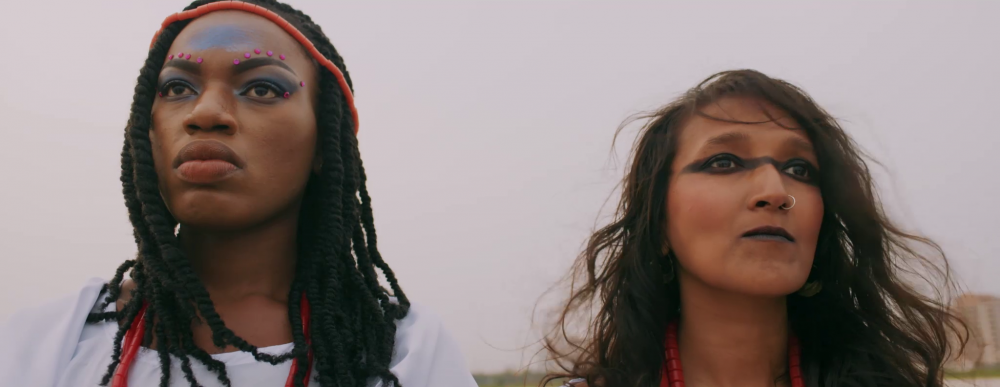
Bruja (2017)
In a post-screening discussion, the members of the collective took the opportunity to set out their intentions. Delivered to an audience of cinemagoers and industry delegates, their playful but incisive manifesto included vetoes of such Nollywood staples as “cliché-styled witch doctors”, “overt melodrama”, “establishing shots of Lekki Bridge” and “religious propaganda”, in favour of the unifying tenets that all films should contain elements of the surreal, feature local dialects, reject self-censorship, and tell stories from an African perspective.
Inspired by global movements like the socially conscious Taiwanese New Wave, Surreal16’s closet cinematic predecessors are Dogme 95 and their infamous Vow of Chastity, whose call for a return to the “traditional values” of cinematic storytelling aimed to quell the influence of Hollywood on Danish cinema. Dogme 95 also launched the careers of arthouse great Danes Thomas Vinterberg and Lars von Trier. Surreal16 speak of a similar intention to create a “new identity” for Nigerian cinema with artistically minded films that move away from the reigning imperialism of Nollywood aesthetics and production practices.
“We haven’t really graduated to what we could call Nigerian cinema yet,” Obasi later explains in an interview. “Describing an industry or an entire country’s filmmaking as Nollywood is a bit of a stretch. You wouldn’t describe the entirety of American cinema as Hollywood or the entirety of Indian cinema as Bollywood.”
Obasi has a point. Can a single style of filmmaking represent an entire nation? In the collective’s view, audiences and the industry wishing to make returns on productions are stuck in a feedback loop where genres such as melodrama and comedy dominate funding steams and multiplex offerings. With only a handful of existing companies with interests across production and exhibition, the end result is a steady stream of generic content that limits the ability for Nigerian cinema to compete globally or stimulate artistic growth.
While it is true that Nollywood is the second largest film industry in the world in terms of films produced, outside of the continent and the diaspora these films have struggled to land with audiences of non-African descent. Compare with the success of Scandi-noir, kung fu films or Japanese animation outside of their domestic markets.
I am compelled to counter with the question: who cares about the non-African or non-Black world? Nollywood is a self-sustaining industry, created to serve a people whose original content has historically been sidelined by other established markets. Secondly, Nollywood chimes with audiences. Unencumbered by notions of high and low art, the industry’s films are cultural artifacts filled with fragments of Nigerian popular culture and complex often-competing ideologies. 1992’s Living in Bondage, the first Nollywood film, traverses these commonplace realities, exploring the often limited opportunity for many Nigerians to participate in the nation’s capitalist regime, commonplace misogyny, and the antagonism between Christianity and African spirituality.
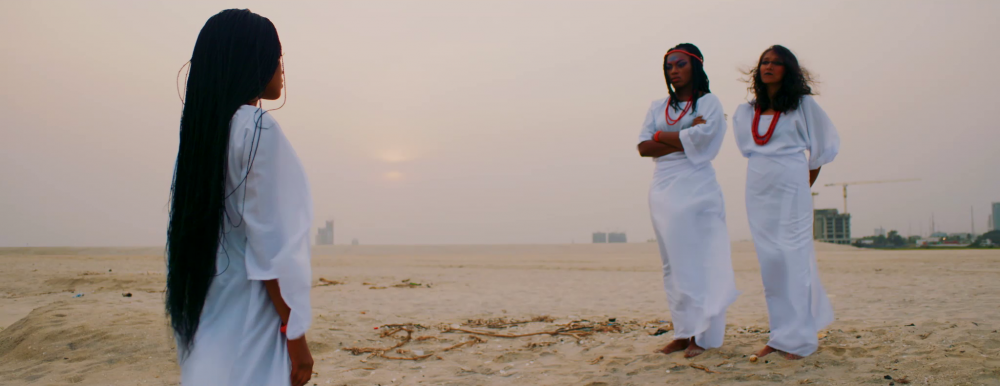
Bruja (2017)
From Obasi’s perspective “films that have a global resonance” are key to forming a distinction between Nollywood and Nigerian cinema. Speaking to the collective, I don’t get the impression they wish to eradicate Nollywood altogether. The call for a “new” identity reads more as a provocation for an approach to filmmaking in Nigeria that gives more space to diverse narratives and styles. Nollywood cinema certainly isn’t the full story. The label often eclipses the work of Nigeria’s celluloid filmmakers Hubert Ogunde, Eddie Ugbomah and Ola Balogun in the 1970s. Or more recent work that sits outside the themes or aesthetics associated with Nollywood, such as Daniel Oriah’s Taxi Driver: Oko Ashewo (2015), Ifeoma Chukwuogo’s Bariga Sugar (2017), Kenneth Gyang’s Confusion Na Wa (2013) and Mildred Okwo’s Kafkaesque The Meeting (2012).
Given the global aspirations of Surreal16, I ask Omonua how politics and representation play in his work. His previous films tend to explore the darker side of life in Nigeria. Sún Èjè (2014) looks at the illicit body parts trade, Born (2016) deals with illegal abortion and Yahoo Boy (2016) depicting a day with a cyber con artist. “I’m not too fussed about what [international] audiences think. Am I showing Nigeria in a bad light? It’s not really my concern. I think being truthful and being honest is far more interesting.”
As a director Omonua is meticulous in his ability to elicit unobtrusive performances. Though his directorial style is varied, his gaze remains objective in terms of any moral judgment of his characters, even though the films are driven by subjective experiences. I detect another true disciple of cinema as he describes his inspirations: Hong Kong director Wong Kar Wai, Satyajit Ray for his humanity, Ozu Yasujiro for his methodology and Belgium’s Dardenne brothers, whose genre blending of realism and thriller produces stories about everyday life.
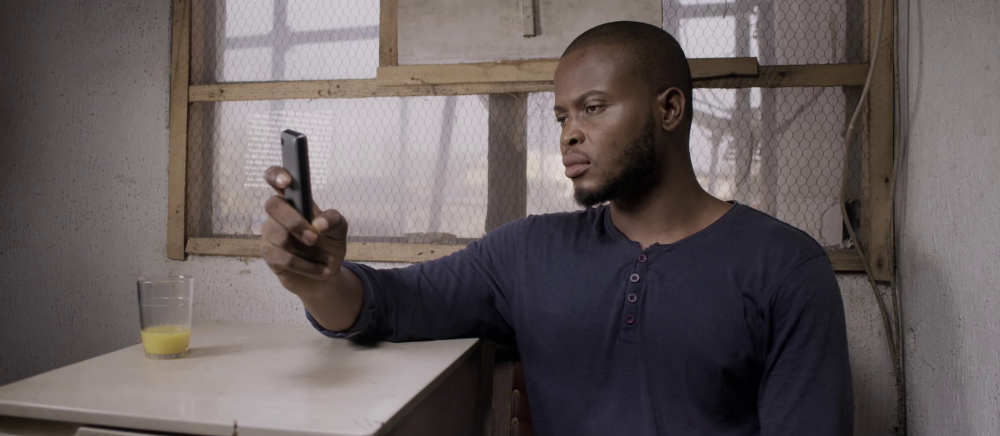
Brood (2017)
Omonua insists the political messages in his work live in the subtext. I’m not entirely convinced of an apolitical point of view, however, an affinity for truth is always the best place to start. He describes his writing process as largely organic, triggered by the desire to entertain and at a deeper level a fascination with how people find themselves in particular situations. His stories come from bizarre incidents in people’s lives: essentially things he hears in conversations, on the radio and via the treasure trove that is the Nigerian Sun Newspaper crime section.
At the AFRIFF event at Palm’s Mall, Surreal16’s strong Eurocentric influences hadn’t gone unnoticed by the audience. I remind Makama of this critique. Peeved, he asks me to name five great Nigerian filmmakers from the 1970s. Studiously I name Ola Balogun, Hubert Ougnude and Tunde Kelani… I ask what he’s driving at. “I’m just saying that the fact you can’t even name five off the top of your head shows that those influences don’t even exist in the first place. Secondly, where are they where can I see their work? How many Nigerians have seen an Ola Balogun film? Or a Hubert Ogudae film? Where are the films that are going to inspire us? They’re not even available.”
Distribution channels like IROKOTV and Africa Magic are getting films to audiences, but with no prominent archive and piracy issues in an oversaturated market, much of Nigeria’s cinema history disappears in the ether as quickly as it appears. By contrast, filmmakers in francophone Africa have fared better due to their relationships with francophone Europe. That contributes to preservation and co-production. It’s no surprise that Ousmane Sembene, Idrissa Ouédraogo, Abderrahmane Sissako and Haile Garima are also touch points for the group.
For Makama in particular the work of his direct predecessors “doesn’t hit at gut level”. As the cost of shooting on film increased, many celluloid filmmakers found it difficult to develop a creative practice. “Africa has been a dumping ground for Europe and America. We’ve been feeding off [that] content, so of course my work is going to be of Eurocentric influence and I frankly don’t give a shit. It is what it is.” If Obasi is Surreal16’s Minister of Development, and Omonua of Craft, then Makama is the Minster of Rationalism. “Where our films are is a reflection of where we are economically and politically. One can’t go beyond the other.”
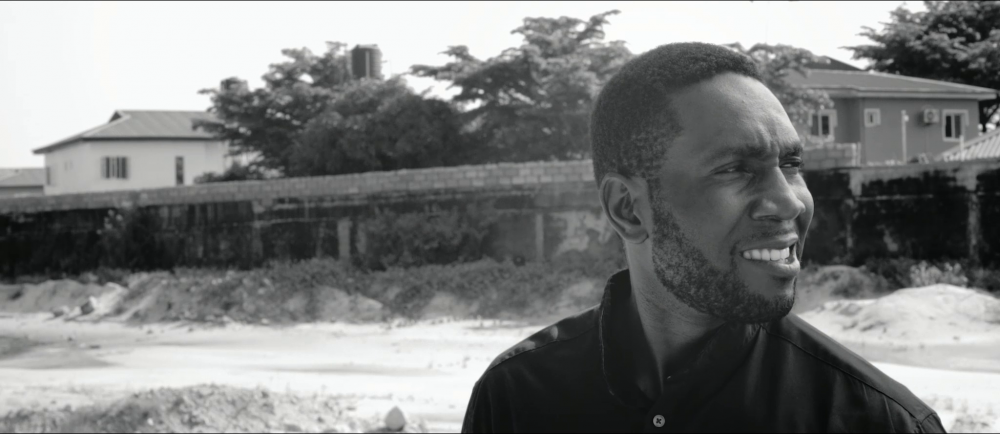
Shaitan (2017)
Makama is dedicated to the creative prospects of the collective, and his irreverence isn’t entirely a provocative façade. To me it seems rooted in a deep connection and frustration with Nigeria and how far the political ill health of the country inhibits all areas of progress. Despite the widespread recognition of Green White Green and its idiosyncratic critique of the nation, the film did not attain theatrical distribution (it has now been acquired by Netflix). Skepticism is healthy, and Makama’s voice is a useful reminder of the challenges the group face in their mission to diversify their creative landscape.
In Omonua’s Brood, the Wong Kar Wai-isms of high visual style are present, but the exclusive use of Pidgin English overpowers the scenario with an incredible sense of place. Dish’s presence as an ingenue in each of the Visions films is a masterstroke. Her quality is difficult to articulate. She embodies an intake of breath before a cultural explosion – a sense of something entirely new about to happen – at the same time the notes of her aesthetic are unmistakable as a young Nigerian woman of this era.
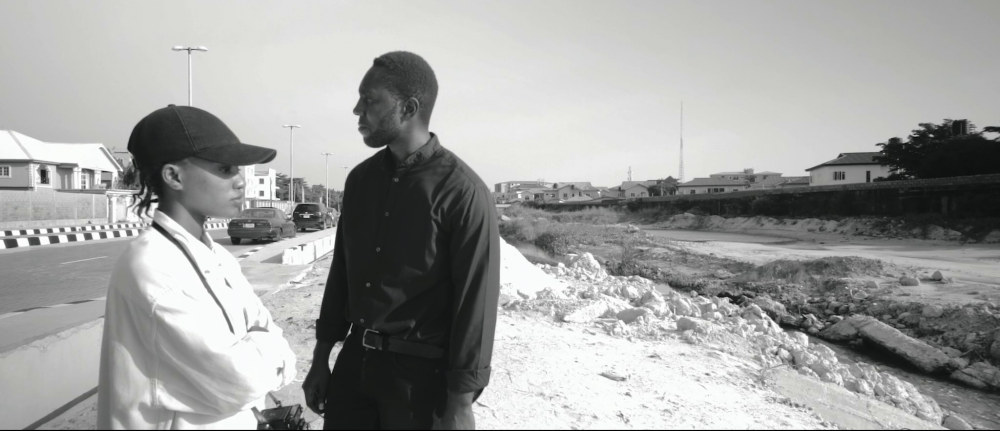
Shaitan (2017)
“There is such a thing as the cinema language and it’s not limited to Nigeria, Europe, America, Asia or anywhere,” says Obasi. If his own work were to dial into any identity it would be one that is eccentric and ‘Africanesque.’ This sentiment saturates the trailer for his next solo movie Hello, Rain, a kaleidoscopic, futuristic romp adapted from a short story by acclaimed sci-fi scribe Nnedi Okorafor about a scientist-witch who creates a wig that grants supernatural powers.
Surreal16 present an interesting challenge to their industry and to the expectations placed onto what we tend to label contemporary African art. What is most exciting is the space the collective wish to give themselves to develop artistically. Their manifesto acts as a call to arms for their contemporaries to join them in that endeavour. They are currently working on an anthology feature, Kabal, set at an exclusive party in a plush mansion with festivities split between the common hoard, the elites and their inner court of servers. Kabal promises to animate the greedily devoured pages of Nigeria’s editorial society sections with the collective’s signature style and appetite for sharp social critique.
Finally, I ask Surreal16 what their aspirations are for themselves and for their industry within the next five years, and I give the last word to Makama, Minister of Rationalism: “Good luck to them, and good luck to us.”
This feature comes from a partnership between Something We African’s Got and People’s Stories Project (PSP) — part of the British Council’s arts programme in sub-Saharan Africa in association with British Council Film, who are also supporting the I just Dey Observe event at BFI Southbank in London.




